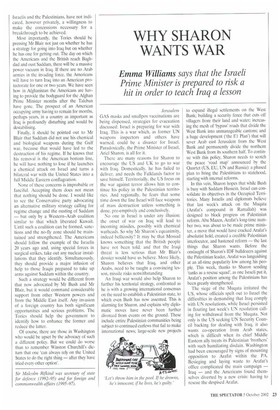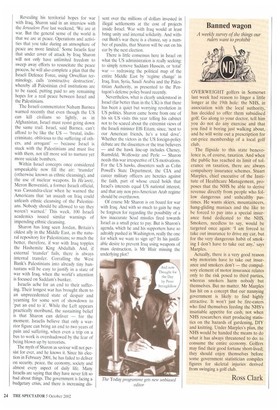WHY SHARON WANTS WAR
Emma Williams says that the Israeli
Prime Minister is prepared to risk a hit in order to teach Iraq a lesson
Jerusalem GAS masks and smallpox vaccinations are being dispensed, strategies for evacuation discussed: Israel is preparing for war with Iraq. This is a war which, as former UN weapons inspectors and others have warned, could be a disaster for Israel. Paradoxically, the Prime Minister of Israel, Arid l Sharon, is all for it.
There are many reasons for Sharon to encourage the US and UK to go to war with Iraq. Domestically, he has failed to deliver, and needs the Falklands factor to save himself. Territorially. the US focus on the war against terror allows him to continue his policy in the Palestinian territories. And regionally, he fears that some time down the line Israel will face weapons of mass destruction unless something is done, pre-emptively and conclusively.
No one in Israel is under any illusion: the onset of war on Iraq will lead to incoming missiles, possibly with chemical warheads. So why Mr Sharon's equanimity, indeed bellicosity? It may be that Mossad knows something that the British people have not been told, and that the Iraqi threat is less serious than Mr Blair's dossier would have us believe. More likely, Sharon believes that Iraq, and other Arabs, need to be taught a convincing lesson, missile risks notwithstanding An Iraqi war would also help Sharon to further his territorial strategy, confronted as he is with a growing international consensus on the need to establish a Palestinian state, to which even Bush has now assented. This is alarming for Sharon, and explains why diplomatic moves have never been further divorced from events on the ground. These include entire Palestinian communities being subject to continued curfews that fail to make international news: large-scale new projects to expand illegal settlements on the West Bank; building a security fence that cuts off villagers from their land and water; increasing the mesh of 'bypass' roads that divide the West Bank into unmanageable cantons; and a huge development (the El Plan') that will sever Arab east Jerusalem from the West Bank and permanently divide the northern West Bank from its southern half. To continue with this policy, Sharon needs to scotch the peace 'road map' announced by the Quartet (US, EU, UN and Russia): a phased plan to bring the Palestinians to statehood, starting with internal reforms.
In this vein, Sharon hopes that while Bush is busy with Saddam Hussein, Israel can consolidate its objectives in the Occupied Territories. Many Israelis and diplomats believe that last week's attack on the Muqata (Arafat's compound in Ramallah) was designed to block progress on Palestinian reform, Abu Mazen, Arafat's long-time number two, was about to be made prime minister, a move that would have cracked Arafat's absolutist hold, created a credible Palestinian interlocutor, and hastened reform — the last things that Sharon wants. Before the onslaught of Sharon's IDF bulldozers against the Palestinian leader, Arafat was languishing at an all-time popularity low among his people. This week, thanks to Sharon sending 'tanks as a rescue squad', as one Israeli put it, Arafat's position among the Palestinians has been greatly strengthened.
The siege of the Muqata irritated the US, whose officials spelt out to Israel the difficulties in demanding that Iraq comply with UN resolutions, while Israel persisted in flouting last week's UN resolution calling for withdrawal from the Muqata. Not only is the US seeking UN Security Council backing for dealing with Iraq, it also wants co-operation from Arab states, which is difficult when its chief Middle Eastern ally treats its Palestinian 'brothers' with such humiliating disdain. Washington had been encouraged by signs of mounting opposition to Arafat within the PA. Besieging and laying waste to Arafat's office complicated the main campaign — Iraq — and the Americans found themselves diverted by a new crisis: having to rescue the despised Arafat. Revealing his territorial hopes for war with Iraq, Sharon said in an interview with the Jerusalem Post last weekend, 'We are at war. But the general sense of the world is that we are at peace. Operations and activities that you take during an atmosphere of peace are more limited: Some Israelis fear that under cover of attack by Iraq Sharon will not only have unlimited freedom to sweep away efforts to resuscitate the peace process, he will also complete a plan that the Israeli Defence Force, using Orwellian terminology, calls 'constructive destruction', whereby all Palestinian civil institutions are to be razed, putting paid to any remaining hopes for a real peace between Israel and the Palestinians.
The Israeli commentator Nahum Barnea warned recently that even though the US can kill civilians so lightly, as in Afghanistan, Israel must resist going down the same trail. Israel, said Barnea, can't afford to be like the US — 'brutal, indiscriminate, oblivious to the suffering of others, and arrogant' — because Israel is stuck with the Palestinians and must live with them not till more soil to nurture yet more suicide bombers.
Within Israel concepts once considered unspeakable now fill the air: 'transfer' (otherwise known as ethnic cleansing), and the use of nuclear weapons. In Ha'aretz, Meron Benvenisti, a former Israeli official, was Cassandra-clear when he warned the Americans that 'an assault on Iraq could unleash ethnic cleansing of the Palestinians. Nobody should be allowed to say they weren't warned.' This week, 100 Israeli academics issued similar warnings of impending ethnic cleansing.
Sharon has long seen Jordan, Britain's oldest ally in the Middle East, as the natural repository for Palestinians; so much the better, therefore, if war with Iraq topples the Hashemite King Abdullah. And, if external 'transfer' fails, there is always internal transfer. Corralling the West Bank's Palestinians into already tiny bantustans will be easy to justify in a state of war with Iraq, when the world's attention is focused on Saddam's bunker.
Israelis ache for an end to their suffering. Their longest war has brought them to an unprecedented state of despair and yearning for some sort of showdown to 'put an end to it'. While the Left appears practically moribund, the sustaining belief is that Sharon can deliver — for the moment. Israelis believe that only a warrior figure can bring an end to two years of pain and suffering, when even a trip on a bus to work is overshadowed by the fear of being blown up by terrorists.
The myth of Sharon as saviour will not persist for ever, and he knows it. Since his election in February 2001, he has failed to deliver on security, peace, the economy, society and almost every aspect of daily life. Many Israelis are saying that they have never felt so bad about things. The government is facing a budgetary crisis, and there is increasing dis
sent over the millions of dollars invested in illegal settlements at the cost of projects inside Israel. War with Iraq would at least bring unity and internal solidarity. And without Bush's war there is a chance, say a number of pundits, that Sharon will be out on his ear by the next election.
There is little consensus here in Israel on what the US administration is really seeking: to simply remove Saddam Hussein, or 'total' war — redrawing the political map of the entire Middle East by 'regime change' in Iraq, Iran, Syria, Saudi Arabia and the Palestinian Authority, as presented to the Pentagon's defense policy board recently.
Nevertheless, what is clearly understood in Israel (far better than in the UK) is that there has been a quiet but worrying revolution in US politics. Sharon came home from one of his six US visits this year telling his cabinet not to be scared about the extremist views of the Israeli minister Effi Eitam, since, 'next to our American friends, he's a total dove'. Whether the victors in the US foreign-policy debate are the dissenters or the true believers — and the hawk line-up includes Cheney. Rumsfeld, Wolfowitz and Perle — Sharon needs this war irrespective of US motivations. For the US hawks, dissenters such as Colin Powell's State Department, the CIA and career military officers are heretics against the faith, part of whose creed holds that Israel's interests equal US national interest, and that any non pro-American Arab regime should be overthrown.
Of course Mr Sharon is on board for war with Iraq. And with so much to gain he may be forgiven for regarding the possibility of a few inaccurate Scud missiles fired towards Israel as a small price to pay. But is Sharon's agenda, which he and his supporters have so adroitly pushed in Washington, really the one for which we want to sign up? In his justifiable desire to prevent Iraq using weapons of mass destruction, is Mr Blair missing the underlying plot?





































































 Previous page
Previous page